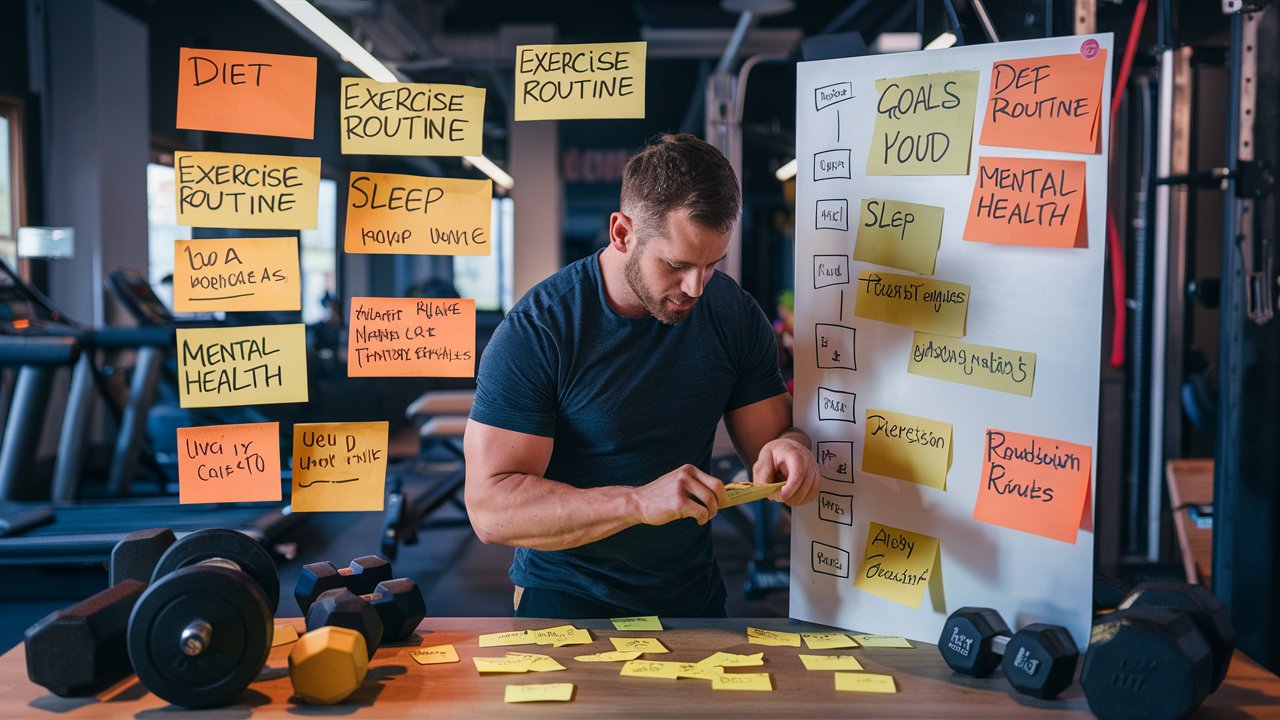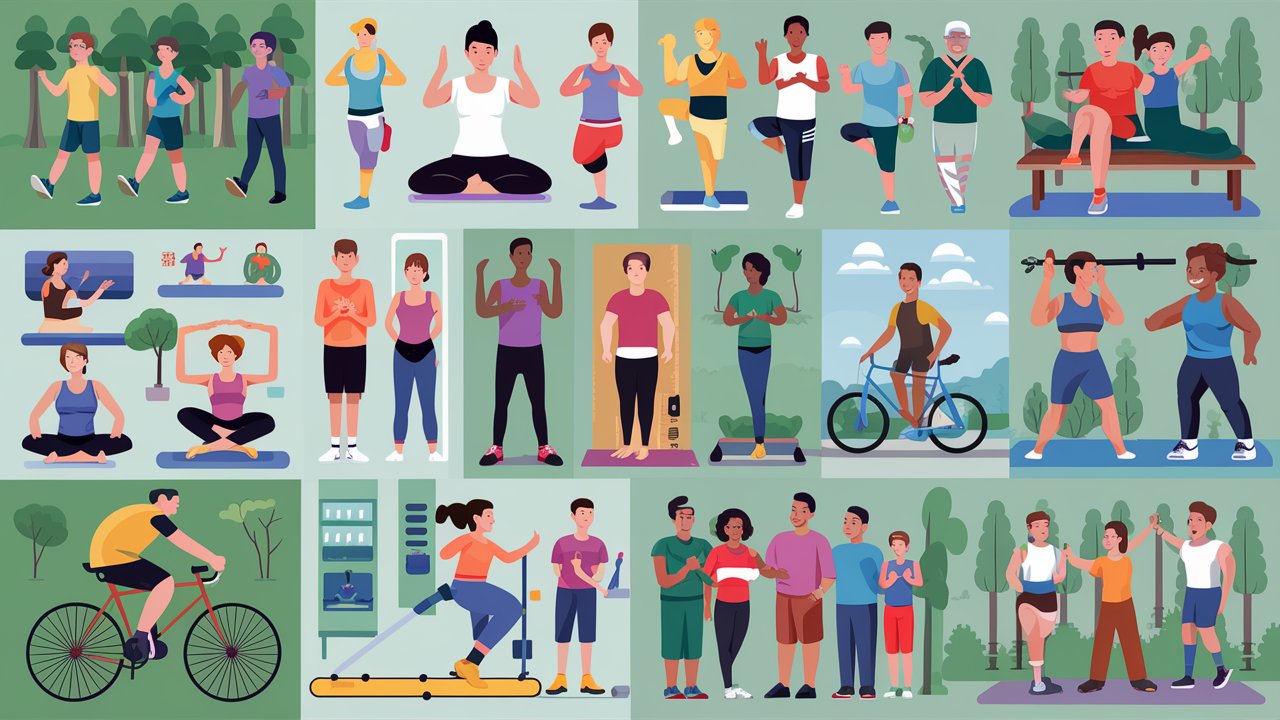With the demanding schedule most individuals have in today’s world, at times it becomes a challenge to stay fit. However, practicing daily exercise or workout session in our daily timetable or plan is one of the ways of promoting general and mental health. The secret is to look for something that fits your schedule and at the same time provides the right amount of pressure to spur you to action. If you are spending your time on building muscle or if you are new to exercising here are some tips and ideas on how to keep your body in a good shape and fit through a physical training activity.
Daily exercise is essential for the improvement of our general well-being and health and here’s why you should engage in daily exercise:
The Benefits of Daily Exercise
-
Physical Health
 It should be noted that physical training is one of the essential components that help prevent various illnesses. These include, managing weight, avert any chronic diseases such as heart diseases and diabetes, and build up muscles and bones. According to World Health Organisation, the level of actual exertion in adults comprise at least 150 min of moderate aerobic bustle exclusively in a week.
It should be noted that physical training is one of the essential components that help prevent various illnesses. These include, managing weight, avert any chronic diseases such as heart diseases and diabetes, and build up muscles and bones. According to World Health Organisation, the level of actual exertion in adults comprise at least 150 min of moderate aerobic bustle exclusively in a week.
-
Mental Well-being
Physical fitness cannot be associated with the physical aspect of the human body only, but it also has a tremendous effect on the psychological condition of a person. Exercise is beneficial in controlling stress, anxiety, and depression rates because of the natural release of endorphins when exercising. It gives out endorphins the body natural endorphin hormones that can make you feel happy and relaxed.
-
Improved Sleep
Regarding sleep, it is crucial to notice that getting quality sleep at night is a luxury that people often dream of. Physical activity during the course of the day can enable a person fall asleep faster and have a quality sleep. Still, it is crucial to schedule your workouts correctly; if you exercise right before sleeping, it will have a different result.
-
Increased Energy Levels
Feeling sluggish? Staying active and exercising can improve the energy that is available in the human body. To promote adequate muscle strength and endurance hence enhancing energy to execute various tasks, people should exercise regularly regardless of the type of physical activity to be performed.
One of the most important characteristics of fitness programs is exercise. Hobbies are a thing of the past, and the general population is searching for the right exercise routine for them.
Finding the Right Exercise Routine
-
Identify Your Goals
 If asked one question, what is your primary goal that you are trying to accomplish through your exercise? For instance, it may be weight loss, muscle build up, stress relief, flexibility among others, having desires set will assist you to stick to the plan enthusiastically. By goals, more tailored exercises are chosen depending on the required level and direction of training or the tasks to be completed.
If asked one question, what is your primary goal that you are trying to accomplish through your exercise? For instance, it may be weight loss, muscle build up, stress relief, flexibility among others, having desires set will assist you to stick to the plan enthusiastically. By goals, more tailored exercises are chosen depending on the required level and direction of training or the tasks to be completed.
-
Mix It Up
Change is as good as a vacation or so they say, this is also true with exercising. Switching between the types of workouts ensures one does not get bored and targets various muscles. Consider a mix of:
- Cardio: Jogging, biking, swimming, or power walking in the form of aerobic exercise.
- Strength Training: Squats, push-ups, or resistance bands Pull-ups
- Flexibility and Balance: Stretching, such as Yoga, Pilates or tai chi can be done easily
-
Create a Schedule
Consistency is key. Devise a plan of which exercises need to be done on a weekly basis taking into consideration the lifestyle. But it does not have to be like this – even small sessions that will take place several times a day can help. For instance, it is recommended to engage in Thirty minutes moderate exercises five days a week.
-
Listen to Your Body
However, while embracing the principles, one must not forget to work within their limits as the need for pushing limits is also dangerous if not checked. In case you are experiencing muscle ache or heavy feeling, it is suggested that you take a day off. It is, therefore, important not to overwork for you may get injuries and progress may be set back.
Staying Motivated
-
Set Realistic Goals
It is critical to set reasonable and attainable objectives because the implementation of poor goals might pressure the motivation. Ensure that there are things you will be achieving in-between the process of changing your habits so that the process will not be discouraging.
-
Find a Workout Buddy
 It is fun mainly when the workout buddy is your friend, thus it is encouraging to work out with your friend. It will also give specific ways in which others can motivate each other and share their progress.
It is fun mainly when the workout buddy is your friend, thus it is encouraging to work out with your friend. It will also give specific ways in which others can motivate each other and share their progress.
-
Track Your Progress
Recording workout sessions or using fitness related applications is good feedback to a fitness program. It is encouraging to see how far you have progressed and that might help motivate you to continue.
-
Reward Yourself
One can recommend giving oneself incentives with an aim of motivating oneself more in other to achieve even more. Sometimes it’s a new shirt or shorts to be worn during workout, a massage session after the rigorous exercise or chocolates and oily foods that you deny yourself during the workout session.
Overcoming Common Barriers
-
Lack of Time
A common reason most people give for not exercising is that they do not have time to exercise. But as it had been said earlier even the packed calendar can easily be fit with short yet efficient workouts. The time-efficient option is the High-Intensity Interval Training or HIIT. Such workouts can be as short as 15-20 minutes, but they can be quite effective.
-
Lack of Motivation
The urge to motivate yourself in exercising can be very hard to come across most of the time more so when all you want is to cuddle up in bed. To counter this, it is recommendable that you set a certain time of the day for the particular workout regime, just like an appointment. Furthermore, discovering a type of exercise that can be fun can take the sting away and suddenly, it is not a chore anymore.
-
Physical Limitations
If a person has certain restrictions movement wise or health issues, then it is highly recommended to discuss the types of movements over with the physician. they can come up with suggestive programs for you and at the same time guarantee its safety and efficacy.
Incorporating Exercise into Daily Life
-
Morning Routine
You will be awake all through the day if you begin the day with exercise; it helps create a positive lifestyle. It might be useful to add a small workout or a physical warm-up session to be performed in the morning. It could just some duration of yoga exercise or going for a walk for some time around the neighbourhood.
-
Workplace Fitness
Staying in a sitting position for long time also has many dangers to health. Take minor intermissions in-between the workday to exercise such as bending or going for a short walk. If feasible, try to get a stand-up desk or take walking meetings.
-
Family Activities
 Sport also can be one of the ways how relatives spend time together. It is possible to plan an active leisure involving walking or biking in forests or playing different sports with friends. On top of this, it assists in improving the physical health among family members and the social cohesiveness.
Sport also can be one of the ways how relatives spend time together. It is possible to plan an active leisure involving walking or biking in forests or playing different sports with friends. On top of this, it assists in improving the physical health among family members and the social cohesiveness.
-
Active Commuting
Perhaps one can walk or cycle to work instead of using a car or other means of transport. It also has the added advantage of rehabilitating physical activity back into our lives and at the same time, flattening the carbon footprint.
You can also read on Exercise, here.
Conclusion
Exercising daily or working out regularly is a process that one has to dedicate his or her time, the returns are very rewarding! Thus, discovering the optimal schedule, keeping oneself active, eradicating everyday challenges can lead to making exercise an effective and satisfying part of the daily schedule. They should bear it in mind that their aim is not to be perfect but to be improving. Every change that you make to assume a healthy lifestyle is a positive progress towards a better future.
